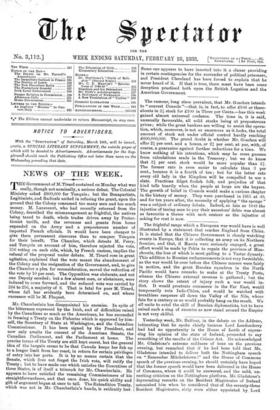The rumour, long since prevalent, that Mr. Goschen intends to
" convert Consols "—that is, in fact, to offer £106 or there- abouts in 21 stock for £100 in Three per Cents.—has this week gained almost universal credence. The time is, it is said, unusually favourable, all solid stocks being at preposterous prices ; while the great bankers are willing to assist the opera- tion, which, moreover, is not so enormous as it looks, the total amount of stock not under official control hardly reaching £600,000,000. The grand doubt is whether Mr. Goschen will offer 21 per cent. and a bonus, or 2; per cent. at par, with, of course, a guarantee against further reductions for a time. We know nothing of his intentions, which may be mere guesses from calculations made in the Treasury ; but we do know that 2i per cent. stock would be more popular than 21. The former rate is even easier to calculate than 3 per cent., because it is a fourth of ten ; but for the latter rate every old lady in the Kingdom will be compelled to use a slate. Fractions fidget foolish folk, and prejudice of that kind tells heavily when the people at large are the buyers. The growth of belief in Consols would make a curious chapter in the history of money. They were purchased in 1815 at 49, and for ten years after, the necessity of applying " the sponge" was a subject of ordinary debate. Indeed, so late as 1848 the injustice of taxing men to pay their ancestors' debts was almost as favourite a theme with mob orators as the injustice of asking for rent is now.


































